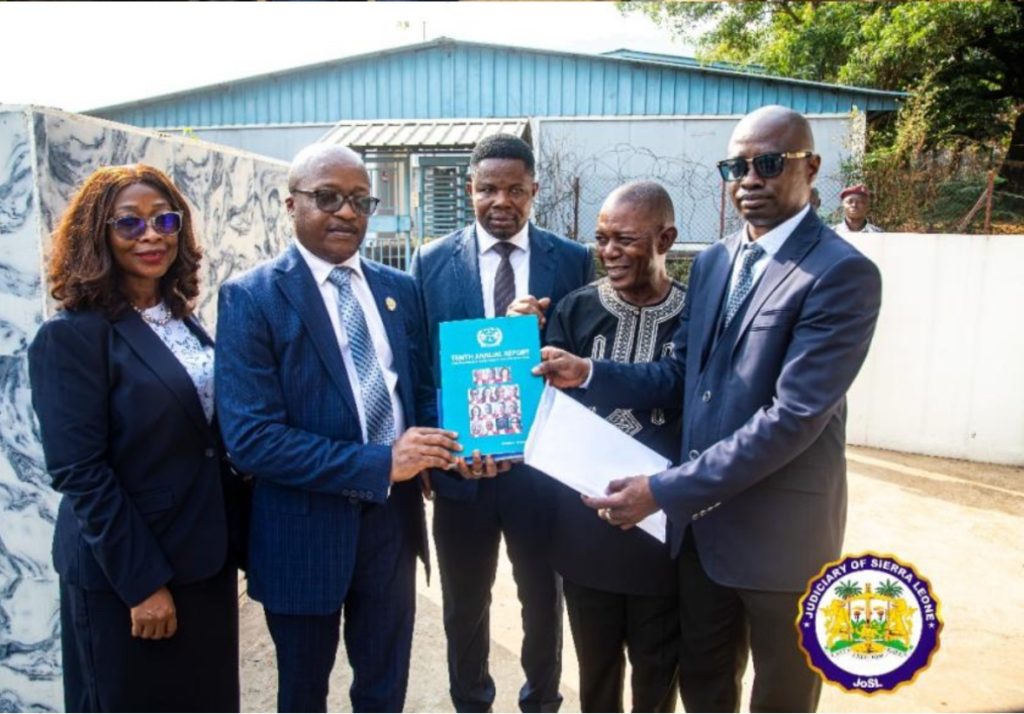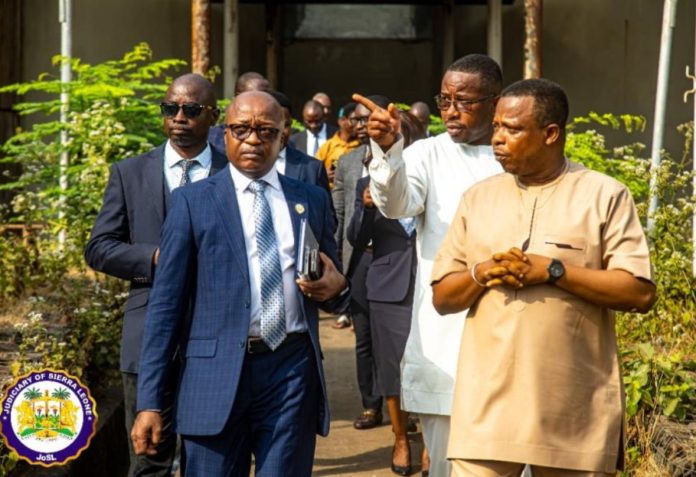AYV News, February 10, 2025
Sierra Leone’s The Chief Justice, His Lordship the Honourable Justice Komba Kamanda together with other Justices of the Superior Courts of Judicature has concluded an official tour of the Residual Special Court for Sierra Leone (RSCSL) peace museum and memorial garden.

The tour, according to the Principal Defender of the Residual Special Court for Sierra Leone, Ibrahim Sorie Yilla was to bring the Chief Justice and the management of the Judiciary up to speed with the work of the Court in line with its mandate. He said over the years, the judiciary has been of immense importance to the work of the court, citing past and current Justices who have served as Judges of the Court.
Welcoming the Chief Justice and his team, Mr. Yilla said the tour would include the inspection of the artefacts in the peace museum and garden and the archiving room, thereby giving the team the opportunity to see first-hand how the records of the Truth Commission and the Special Court have been preserved so far.
Leading the team on the tour, the Outreach and Focal Person of the RSCSL, Patrick A. Fatoma said the Museum provides a vivid display of the nature of atrocities committed against fellow Sierra Leoneans during the 11-year insurgency. He said it also represents the perspectives of key stakeholders in respect of the war including former President Kabba, Hinga Norman, Valentine Strasser and Maada Bio at the time. He added that it is most important that the museum preserves the statements and evidence of witnesses.
Speaking on the role of the outreach team, he said since the trial was sitting for the first time in the theatre where the crimes occurred, it was integral to engage the people of Sierra Leone which took them to the length and breadth of the country and even to neighbouring Liberia to engage and explain to them Charles Taylor’s involvement in the war, reasons for the Court’s establishment, mandate and the way forward for reconciliation.
He said the museum also paid tribute to the United Nations and the Government of Sierra Leone for not interfering at any stage with the operations of the Special Court by giving judges the free hand to do what the law required in bringing to account those who bare the greatest responsibility for the war.
Mr. Fatoma further maintained that the museum offers graphic pictorial evidence of some major artefacts used by forces involved in the war including guns, military regalia and uniforms won by fighters, charms, magic, bow and arrows, mass graves and slaughter houses among others, adding that these should be a reminder to generations yet unborn of one of the most brutal civil wars in human history.
Citing the recommendations of the Truth and Reconciliation Commission, he stressed that school going pupils have often been given the opportunity to go round the facilities and have a glimpse of the consequences of civil unrest, thereby warning them to deviate completely from the causes of the war and be leaders of tomorrow.
Archivist at the RSCSL, Hansel Mags-King said the archives room helps with the preservation of the evidence via electronic means of both public and confidential witnesses for researchers and other educational purposes. He added that the section boasts of a well-managed website with up to date information on the trials.
The Chief Justice thanked the Registrar of the RSCSL, Madam Binta Mansaray and her team for the excellent work they have done over the years in preserving such important data of the country’s history, adding that their work should really be made known to ordinary Sierra Leoneans who think that the conclusion of the trials marked the complete end of the operations of the court.
The Residual Special Court for Sierra Leone was established by an agreement between the United Nations and the Government of Sierra Leone to oversee the continuing legal obligations of the Special Court for Sierra Leone after its closure in 2013. These include conducting contempt of court proceedings, witness protection, supervision of prison sentences, and management of the SCSL archives.

